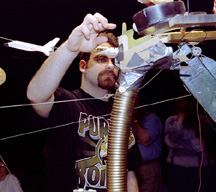 Purdue Science and Health Briefs
Purdue Science and Health Briefs
 Purdue Science and Health Briefs
Purdue Science and Health Briefs
January 1998
NOTE TO JOURNALISTS: Video and photographs of past contests are available. Journalists will not be allowed on the stage with the machines during the competition, but they are welcome on stage before and after the contest. Purdue will provide video and photo pool coverage and direct audio and video feeds. Video b-roll, photos and a news release will be available the afternoon of the event. Satellite assistance is available. If you have questions, call Grady Jones, Purdue News Service, (765) 494-2079; e-mail, grady_jones@purdue.edu
WEST LAFAYETTE, Ind. -- Many of us have very creative ways for turning off an alarm clock, but Purdue University students will be building contraptions to do it for us at the 16th annual Rube Goldberg Machine Contest on Feb. 7.

|
The winner of the Purdue contest goes on to represent the university at the National Rube Goldberg Machine Contest, to be held at Purdue on April 4.
The event honors the late cartoonist Rube Goldberg, who specialized in drawing whimsical machines with complex mechanisms to perform simple tasks.
Teams expecting to compete include the Society of Hispanic Professional Engineers, the Society of Manufacturing Engineers, a joint team of the Society of Women Engineers and Society of Physics Students, Purdue residence halls, and Theta Tau, a professional engineering fraternity that organizes the contest, with support from industrial sponsor General Electric.
The competitors are challenged to build a contraption that uses at least 20 steps to turn off an alarm clock. Each machine must run, be reset and run again in nine minutes. Machines also will be judged and awarded points based on the creative use of materials and use of related themes.
In addition to cash prizes for the top three teams, a "People's Choice" award will be given to the team whose machine gets the most votes from audience members.
Student organizers of the contest maintain a World Wide Web page at https://expert.cc.purdue.edu/~thetatau/RUBE/
CONTACT: Chad Goze, contest chairman, (765) 743-2461; e-mail, goze@purdue.edu
A few universities have started teaching space exploration as history. At Purdue University, often called the "mother of astronauts," this history is taught with a global perspective.
"Certainly we'll be dealing with some of the science and technology that was developed through space exploration," says Michael Smith, the assistant professor of history who designed the course. "But our greatest concentration will be on the politics and culture of space travel; how governments use it and how people appreciate it as a feat of modern science."
Twenty-one Purdue graduates have been selected for space flight, including the first and last men to walk on the moon, and two of the six American astronauts who have served on board Mir, the Russian space station. Smith's research in developing the curriculum put him in contact with historians at the National Aeronautics and Space Administration who say the course is one of only a couple dozen of its kind in the nation.
Smith says he expects the subject matter to draw students from a variety of disciplines.
"Naturally, we're going to get a lot of history majors, but I think it also could be an attractive option for engineering students as well as liberal arts majors with a general interest in space," he says.
Smith says the course fits into the recent trend to create history courses that defy national boundaries. "Historians tend to teach the history of a single country, but this course offers a much more global perspective," Smith explains. "We're starting to see more and more of this type of instruction at the college level."
Smith's interest in the topic developed out of his studies of 20th century Russian and Soviet history.
"Space exploration is a very good topic for comparative Soviet and American historical studies," Smith says. "The two space programs have been very much the same in terms of achievement and technology, but their institutional frameworks are very different."
The course will cover such topics as the interaction between human values and space exploration; the implications of satellite technology for international relations, the global economy and ecology; and the "cold war" in space between the United States and the former Soviet Union.
"The cultural values, scientific institutions, military imperatives and public policies of these two countries are very different, and it's all reflected in their space programs," Smith explains.
CONTACT: Smith, (765) 494-4122; e-mail, assunta@omni.cc.purdue.edu
Compiled by Amanda Siegfried, (765) 494-4709; e-mail, amanda_siegfried@purdue.edu
Purdue News Service: (765) 494-2096; e-mail, purduenews@purdue.edu
PHOTO CAPTION
A Purdue student resets his team's entry in the 1997 Rube Goldberg Contest. Duct tape
and string were staple materials in creating the machine that loaded a compact disc
into a CD player and played it. (Purdue News Service Photo by Vince Walter)
Color photo, electronic transmission, and Web and ftp download available. Photo ID:
Rube98.local
Download here.
 To the Purdue News and Photos Page
To the Purdue News and Photos Page